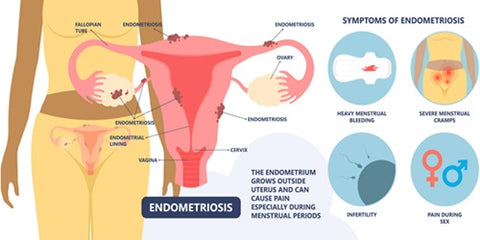
By Dr. Surya Bhagwati
Chief In- House Doctor
BAMS, DHA, DHHCM, DHBTC | 30+ Years of Experience

Endometriosis Treatment in Ayurveda
Endometriosis, a painful condition where tissue similar to the lining of the uterus grows outside the womb, is mentioned in Ayurveda as Yoni Vyapad. Ayurvedic practitioners view the female reproductive system holistically, focusing on balancing doshas and promoting overall well-being. Endometriosis Treatment from an Ayurveda perspective involves a combination of herbal formulations, dietary adjustments, and lifestyle modifications. Specific herbs like Ashoka, Lodhra, and Shatavari are believed to address the root causes. Ayurveda emphasizes the restoration of hormonal balance and reducing inflammation, providing a natural approach to alleviate endometriosis symptoms. For those seeking alternatives, Ayurveda offers promising possibilities for Endometriosis Treatment and endometriosis natural treatment, aligning with the body's natural healing mechanisms.
Causes and Symptoms of Endometriosis
Endometriosis, a chronic gynecological condition, occurs when tissue resembling the uterine lining grows outside the uterus. The precise causes remain unclear, but factors such as genetic predisposition and hormonal imbalances are implicated. Common symptoms include pelvic pain, menstrual irregularities, and discomfort during intercourse. Some women may experience fertility issues. Early diagnosis is crucial for effective Endometriosis Treatment. Managing symptoms often involves a combination of medication, surgery, and lifestyle adjustments. Addressing endometriosis pain treatment is integral to improving the quality of life for those affected. Seeking prompt medical attention and exploring comprehensive approaches can significantly contribute to managing and alleviating the challenges posed by endometriosis.
Endometriosis Ayurvedic Treatments & Diagnosis
In Ayurveda, diagnosing endometriosis involves a holistic evaluation, focusing on balancing doshas and understanding the unique constitution of an individual. Ayurvedic treatments for endometriosis encompass a multifaceted approach, utilizing herbs like Ashoka and Shatavari to regulate hormonal imbalances and reduce inflammation. The therapy aims to address the root causes and enhance overall reproductive health. Ayurvedic practitioners also emphasize lifestyle modifications and dietary adjustments as integral components of the treatment for endometriosis. With a focus on natural healing, Ayurveda offers a promising avenue for Endometriosis Treatment, aligning with the body's innate mechanisms to restore balance and alleviate symptoms effectively.
Ayurvedic medicines for endometriosis
Ayurvedic medicines for endometriosis provide a holistic approach to address the condition's underlying factors. Herbal formulations like Ashoka, Lodhra, and Shatavari are commonly recommended to regulate hormonal imbalances and reduce inflammation associated with endometriosis. These Ayurvedic remedies aim to restore harmony to the female reproductive system, offering a natural and comprehensive approach to Endometriosis Treatment. Ayurveda, with its emphasis on personalized diagnosis and herbal interventions, holds promise in alleviating symptoms and promoting overall well-being. Seeking professional guidance for endometriosis diagnosis and incorporating Ayurvedic medicines into the treatment plan underscores a patient-centered approach to managing this challenging condition.
Embark on a holistic journey for effective Endometriosis Treatment with Ayurveda's personalized approach. From addressing the stages of endometriosis to utilizing herbal formulations like Ashoka, Lodhra, and Shatavari, Ayurvedic interventions offer a comprehensive strategy. Our experts at Dr. Vaidya's understand the intricate balance of the female reproductive system, ensuring tailored solutions for your well-being. Explore our authentic herbal remedies designed to alleviate symptoms and promote overall health. Whether you're in the early stages of endometriosis or seeking holistic care, visit Dr. Vaidya's to discover a natural path to wellness. Take charge of your health—consult with us and embrace the holistic solutions we offer for your unique journey.

Dr. Surya Bhagwati
BAMS (Ayurveda), DHA (Hospital Admin), DHHCM (Health Management), DHBTC (Herbal Beauty and Cosmetology)
Dr. Surya Bhagwati is an established, well-known Ayurvedic expert with over 30 years of experience in treating and consulting in the field of Ayurveda. She is known for the timely, efficient, and patient-centred delivery of quality health care. The patients under her care receive a unique holistic treatment comprising not only medicinal treatment but also spiritual empowerment.




